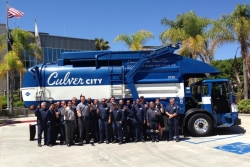The city of Culver City has been named the No. 1 Government Fleet in North America, out of 38,000 public fleets, by the 100 Best Fleets National Fleet Certification and Recognition Program.
Government Fleet publication representatives presented Culver City with this prestigious award at the Government Fleet Expo and Conference held in San Antonio, Texas earlier this month.
“This recognition underscores our continuing commitment to the environment and our efforts to reduce greenhouse gases and increase recycling while, at the same time, saving the taxpayers a significant amount of money,” said Culver City Mayor Jeffrey Cooper.
This achievement is awarded to only one of a large number of government fleet organizations in recognition for outstanding contributions and leadership, particularly in the advancement of accountability, efficiencies and use of technologies.
“This is a wonderful accomplishment which we have been striving for since 2004. We are very proud of all of the employees in the Equipment Maintenance and Fleet Services Division,” said Paul Condran, Equipment Maintenance/Fleet Manager.
Award-winning fleets maintain high standards of operations, while demonstrating consistent sustainability practices.
Condran is in charge a diverse fleet of more than 650 pieces of equipment and a staff of 42 people.
“The great staff is really the nucleus of the operation. I always challenge them,” said Condran, who empowers employees to organize staff meetings. “The key is to be consensus-building and flexible,” he said. “All-sides communication is the key.”
Culver City has been a progressive leader in its commitment to maintaining a highly efficient operation and by its use of natural gas as its fuel of choice for its entire fleet. The fleet’s successful efforts have helped boost Culver City’s green image.
“Our use of natural gas throughout our fleet not only reduces emissions and conserves more than 800,000 gallons of diesel fuel every year, but it also saves Culver City residents more than $1.4 million every year. In addition, our fleet operation qualifies as a “Green Station” under the State Department of Toxic Substance and Controls, which means that our program aggressively adheres to a 100-point recycling program and includes the proper management and recycling of everything from engine oil to metals and more,” said Cooper.
Culver City’s fleet includes refuse and public works trucks, standard autos, fire and transit buses.
“This recognition says great things about our efforts with our transportation fleet, but what it really does is continue a theme that is very close to my heart: it reminds everyone that Culver City cares about the environment. We continue to be on the leading edge of environmental sustainability, and I am very proud of the efforts we have made,” said Cooper.
This is not the first year Culver City has been recognized for it’s green initiatives. In 1998 the City deployed 20 CNG buses. By 2004, the Culver City bus fleet replaced its entire diesel bus fleet by 2004, became the first 100-percent CNG transit fleet in the South Coast Air Quality Management District and second in the state of California.
Culver City has worked with OEMs to develop a custom CNG sewer truck, a CNG asphalt repair truck used to repair potholes and cracks, and a street light repair bucket truck.
The CNG fleet fuels at the city’s dedicated CNG station completed in 1998 and redesigned again in 2008. Condran said the City receives good rates from its natural gas provider.
Embracing the concept of continuous improvement, Condran along with his staff continue to come up with new goals and objectives to improve operations.
“They’re performing the work, not me,” Condran said.
“Involving staff helps provide a sense of ownership and pride and cultivates excellent morale.”
Award winning fleets, have established and maintained high standards of operation, while demonstrating consistent sustainability practices throughout their operations.
“To be successful, the right attitude is fundamental,” said Condran. “You have to come to work everyday and walk the walk. While important, you can’t allow the issues to be the primary cycle of discussion. You must remain positive. The key is to come to work everyday with the right attitude and perform a good job. This should be more than your work — this is your vocation. We are part of an industry. We work for a great city.”













